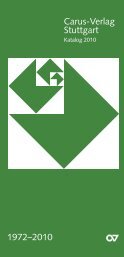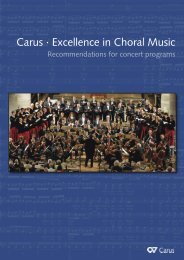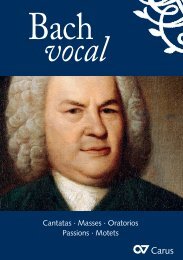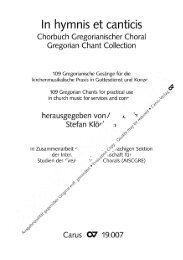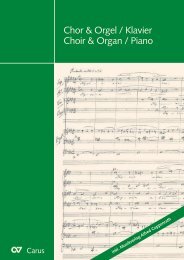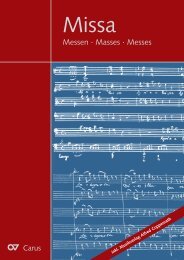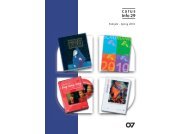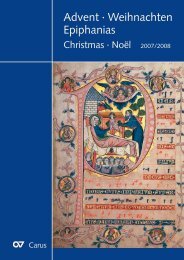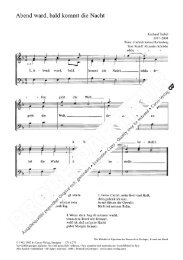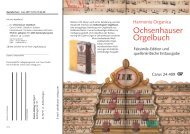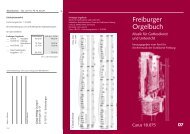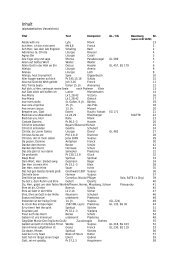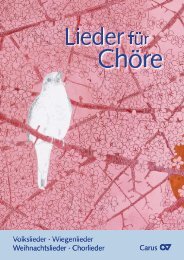Mendelssohn Bartholdy
Mendelssohn Bartholdy
Mendelssohn Bartholdy
Create successful ePaper yourself
Turn your PDF publications into a flip-book with our unique Google optimized e-Paper software.
Carus<br />
<strong>Mendelssohn</strong><br />
<strong>Bartholdy</strong><br />
The complete sacred vocal music<br />
Sheet music & CDs<br />
Urtext
2<br />
Content<br />
The sacred choral works 4<br />
The Stuttgart <strong>Mendelssohn</strong> Editions 5<br />
Study scores 6<br />
Works with orchestra<br />
The three oratorios 8<br />
Handel / <strong>Mendelssohn</strong> 11<br />
The five psalms 12<br />
The eight chorale cantatas 13<br />
Latin and German church music 14<br />
Ich weiß ein Mädchen hübsch und fein<br />
Carus 40.334/30 · postcard<br />
Sacred works a cappella and works<br />
with a keyboard instrument<br />
Women’s choir 18<br />
Men’s choir 18<br />
Mixed choir 19<br />
Works for solo voice 24<br />
Secular choral music a cappella 26<br />
Collections 27<br />
Facsimile editions, posters, postcards 28<br />
Compact Discs 30<br />
For German speaking readers<br />
R. Larry Todd<br />
Felix <strong>Mendelssohn</strong> <strong>Bartholdy</strong><br />
Sein Leben · Seine Musik (His life · his music)<br />
German translation by Helga Beste and Thomas<br />
Schmidt-Beste with ca. 80 pictures and more<br />
than 300 examples as well as an work list<br />
Hardcover – ca. 750 p.<br />
ISBN 978-3-89948-098-6<br />
24.030 book July 2008<br />
Abendsegen. Herr, sei gnädig 19<br />
Abschied vom Walde op. 59,3 26<br />
Ach Gott, vom Himmel sieh darein 13<br />
Acis und Galatea 11<br />
Adspice Domine. Vespergesang op. 121 18<br />
Allein Gott in der Höh sei Ehr � 19<br />
Alleluja (from Deutsche Liturgie) � 19<br />
Amen (from Deutsche Liturgie) � 19<br />
Auf Gott allein will hoffen ich 19<br />
Aus tiefer Not schrei ich zu dir op. 23,1 19, 21<br />
Ave Maria op. 23,2 19<br />
Ave maris stella � 24<br />
Beati mortui / Selig sind op. 115,1 18<br />
Cantique pour l’Eglise Wallonne � 19<br />
Choral collection Brahms · <strong>Mendelssohn</strong> · Schubert 27<br />
Christe, du Lamm Gottes � 13<br />
Christus op. 97 (fragment) 9<br />
Das Gesetz des Herrn ist ohne Wandel � 21<br />
Das Leiden Christi (Christus, II) op. 97,2 9<br />
Deine Rede präg’ ich meinem Herzen ein 21<br />
Deines Kinds Gebet erhöre op. 96,2 15, 19<br />
Denn er hat seinen Engeln befohlen 19<br />
Der 42. Psalm op. 42. Wie der Hirsch schreit 12<br />
Der 95. Psalm op. 46. Kommt, laßt uns anbeten 12<br />
Der 98. Psalm op. 91. Singet dem Herrn 12<br />
Der 114. Psalm op. 51. Da Israel 12<br />
Der 115. Psalm op. 31. Non nobis 12<br />
Der du die Menschen lässest sterben op. 112,2 24<br />
Die Deutsche Liturgie� 19<br />
Die Frauen und die Sänger 26<br />
Die Geburt Christi (Christus, I) op. 97,1 9<br />
Die Himmel erzählen � 21<br />
Die Primel op. 48,2 26<br />
Doch der Herr, er leitet op. 112,1 24<br />
Drei geistliche Lieder und Fuge op. 96 15, 19<br />
Drei Kirchenmusiken op. 23 19<br />
Drei Motetten op. 39 for women’s choir 18<br />
Drei Motetten op. 69 21<br />
Drei Psalmen op. 78 21<br />
Dreizehn Psalmmotetten � 21<br />
Ein Tag sagt es dem andern � 21<br />
Ehre sei dem Vater (from Dt. Liturgie) � 19<br />
Ehre sei Gott (Gloria / from Dt. Liturgie) 19<br />
Elias · Elijah op. 70 9<br />
Er hat der Sonne eine Hütte gemacht � 21<br />
Erhaben, o Herr, über alles Lob op. 79,6 23<br />
Frohlocket, ihr Völker op. 79,2 23<br />
Frühlingsfeier op. 48,3 26<br />
Gelobet sei Gott � 21<br />
Gloria in Es 15<br />
Gott, du bist unsre Zuversicht 21<br />
Hark, the herald angels sing 21, 24<br />
Hebe deine Augen auf (Terzett from Elijah) 18<br />
Heilig ist Gott (Sanctus / from Dt. Liturgie) 19<br />
Herr Gott, dich loben wir � 15<br />
Herr Gott, du bist unsre Zuflucht op. 79,3 23<br />
Herr, gedenke nicht op. 79,4 23<br />
Herr, nun lässest du deinen Diener op. 69,1 21, 22<br />
Herr, sei gnädig. Abendsegen 19<br />
Herr, wir traun auf deine Güte op. 96,3 15<br />
Works listed alphabetically 3<br />
Hör mein Bitten. Hymne 15, 22<br />
Hora est � 22<br />
Hymne op. 96 15<br />
Ich harrete des Herrn 22<br />
Ich weiche nicht von deinen Rechten 21<br />
Ich will den Herrn preisen � 21<br />
Jauchzet dem Herrn in A op. 69,2 21, 22<br />
Jauchzet dem Herrn in C 22<br />
Jauchzet Gott, alle Lande � 21<br />
Jesu, meine Freude 13<br />
Jesus, meine Zuversicht � 22<br />
Jube Domne � 22<br />
Kyrie in A (from Deutsche Liturgie) 19<br />
Kyrie in c � 22<br />
Kyrie in d � 15<br />
Lasset uns frohlocken op. 79,1 23<br />
Laß, o Herr, mich Hilfe finden op. 96,1 15, 19<br />
Laßt sein heilig Lob uns singen op. 96,4 15, 19<br />
Lauda Sion op. 73 15<br />
Laudate pueri op. 39,2 18<br />
Lieder im Freien zu singen (Vol. I–V) 26<br />
Lobgesang. Sinfonie-Kantate op. 52 15<br />
Magnificat in D � 15<br />
Mein Gott, warum hast du op. 78,3 21, 22<br />
Mein Herz erhebet Gott. Dt. Magnificat 21, 22<br />
Mitten wir im Leben sind op. 23,3 19, 22<br />
Music for choir and organ 27<br />
Neun Psalmen nach Lobwasser und Tate � 22<br />
O beata et benedicta � 18<br />
O Haupt voll Blut und Wunden 13<br />
Paulus · St. Paul op. 36 9<br />
Periti autem / Es strahlen hell op. 115,2 18<br />
Richte mich, Gott op. 78,2 � 21, 22<br />
Sahst du ihn herniederschweben 23<br />
Salve Regina � 24<br />
Sechs Sprüche op. 79 23<br />
St. Paul · Paulus op. 36 9<br />
Surrexit pastor bonus op. 39,3 18<br />
Tag für Tag sei Gott gepriesen � 21<br />
Te Deum à 4 23<br />
Te Deum à 8 23<br />
Tu es Petrus op. 111 15<br />
Trauergesang. Sahst du ihn op. 116 � 24<br />
Um unsrer Sünden willen op. 79,5 23<br />
Und dieselbige gehet heraus � 21<br />
Und mit deinem Geiste (aus Dt. Liturgie) � 19<br />
Veni Domine op. 39,1 18<br />
Verleih uns Frieden gnädiglich 13, 24<br />
Vom Himmel hoch. Chorale cantata � 13<br />
Vom Himmel hoch � 19<br />
Warum toben die Heiden op. 78,1� 21, 24<br />
Weihnachtschorsätze 19<br />
Weihnachtshymne. Hark, the herald 24<br />
Wer bis an das Ende beharrt 24<br />
Wer nur den lieben Gott läßt walten 13<br />
Wie schön leuchtet der Morgenstern 19<br />
Wir glauben all an einen Gott � 13<br />
Zwei geistliche Chöre op. 115 18<br />
Zwei geistliche Lieder op. 112 24<br />
� = first edition
4 The sacred vocal music The Stuttgart <strong>Mendelssohn</strong> Editions 5<br />
The sacred vocal music<br />
The sacred choral works of Felix <strong>Mendelssohn</strong> <strong>Bartholdy</strong><br />
span nearly the composer’s entire career, and<br />
encompass an especially rich cross section of his<br />
music, beginning with the precocious student works<br />
of the 1820s and culminating in the magisterial oratorio<br />
Elijah, premiered in 1846 and published in full<br />
score only weeks before his death in November<br />
1847.<br />
All told, <strong>Mendelssohn</strong> completed well over 50<br />
sacred compositions, among them a cappella motets,<br />
cantatas, psalm settings, occasional liturgical<br />
pieces, and oratorios. The oeuvre comprises settings<br />
of German texts for the Protestant church, Latin settings<br />
for the Catholic church, a few works for the<br />
Anglican service, and a setting of Psalm 100 for the<br />
Temple in Hamburg. Much of <strong>Mendelssohn</strong>’s sacred<br />
music was first heard not in the church but in the<br />
concert hall, and at the large, popular music festivals<br />
he conducted in Germany and England during the<br />
1830s and 1840s.<br />
Felix <strong>Mendelssohn</strong> <strong>Bartholdy</strong><br />
painting by Theodor Hildebrandt, 1842<br />
Stadtgeschichtliches Museum Leipzig<br />
Carus 40.373/20<br />
The completion of the Carus edition culminates<br />
more than two decades of effort to make available<br />
to the public critical performing editions of the complete<br />
sacred music, including 38 works published for<br />
the first time.<br />
<strong>Mendelssohn</strong>’s sacred music is generally thought to<br />
reflect the dominant influence of J. S. Bach and Handel,<br />
and <strong>Mendelssohn</strong>’s efforts to preserve the heritage<br />
of their music through a stylistic assimilation<br />
into his music. In the case of Bach, of course, <strong>Mendelssohn</strong>’s<br />
performance of the St. Matthew Passion<br />
in 1829 counts as the watershed event that<br />
launched the nineteenth-century Bach revival, a<br />
movement that found expression in a series of student<br />
cantatas <strong>Mendelssohn</strong> composed (still relatively<br />
unknown) and later, in the oratorios St. Paul and<br />
Elijah. In the case of Handel, <strong>Mendelssohn</strong> was a<br />
tireless advocate for performances of Handel’s oratorios,<br />
and indeed was active as an editor of Handel’s<br />
music. The Handelian choral style found a new<br />
resonance in <strong>Mendelssohn</strong>’s psalm settings for the<br />
concert hall and in his own oratorios as well. But if<br />
Bach and Handel loom as the two major influences<br />
on <strong>Mendelssohn</strong>’s mature style, his choral music reveals<br />
a variety of other models, and testifies to the<br />
full extent of the composer’s historical interests.<br />
Thus, the posthumously published Tu es Petrus<br />
(1827) betrays its origins in the polyphony of Palestrina;<br />
the sixteen-voice motet Hora est (1828)<br />
draws on the polychoral tradition of the Baroque;<br />
and the lush setting of the sequence Lauda Sion<br />
(1846) is indebted to Cherubini and other Italian<br />
masters.<br />
The Carus editions in the <strong>Mendelssohn</strong> series are<br />
provided with probing historical and analytical prefaces,<br />
critical reports, and selected facsimiles of primary<br />
sources. Each edition is based on manuscript<br />
and printed sources from <strong>Mendelssohn</strong>’s time, and<br />
opens a window into the work of one of the most<br />
renowned German composers.<br />
R. Larry Todd<br />
The Stuttgart <strong>Mendelssohn</strong> Editions · Urtext<br />
The Stuttgart <strong>Mendelssohn</strong> Editions, now numbering<br />
some 130 works, occupy a paramount position<br />
among Carus’s Urtext series. When work on our<br />
<strong>Mendelssohn</strong> edition began in the 1970s, large parts<br />
of the composer’s early oeuvre were still terra incognita.<br />
As a result, the Stuttgart <strong>Mendelssohn</strong> Editions<br />
contain a surprisingly large number of first publications<br />
for a composer of <strong>Mendelssohn</strong>’s stature.<br />
Mendlssohn was a highly self-critical composer who<br />
constantly polished his music. Once a work had been<br />
premiered, he almost always altered it again for publication,<br />
as can be seen in the two great oratorios.<br />
Many of his pieces were revised for publication only<br />
to be left unpublished (e.g. the psalm Richte mich,<br />
Gott) or were never intended for publication in the<br />
first place. In such cases, decisions have to be made<br />
regarding conflicting versions and ambiguous readings.<br />
The fact that there is still no complete catalog of<br />
<strong>Mendelssohn</strong>’s music and its sources makes it difficult<br />
to complete the editorial work. However, thanks to<br />
the scholarly assistance of R. Larry Todd, who has edited<br />
a great many of the works himself, we were able<br />
to enlist the editorial services of authoritative <strong>Mendelssohn</strong><br />
scholars from Europe and the United States.<br />
Unlike many earlier prints, the Stuttgart <strong>Mendelssohn</strong><br />
Editions do not make use of the old Gesamtausgabe<br />
volumes published in the 1870s without any indication<br />
of the sources consulted. Nor do we make use of<br />
original prints issued posthumously in the 19th century,<br />
preferring instead only those that the composer<br />
himself saw into print. Thus, our editions of St. Paul,<br />
Lobgesang, and the five great psalm settings, among<br />
others, are the first scholarly, critical editions of these<br />
famous works altogether. In all other cases, our editions<br />
proceed directly from the composer’s autograph<br />
scores. Our edition of Lauda Sion, for example, is the<br />
first to reproduce the version heard at the première,<br />
whereas until now the work has invariably been performed<br />
from the original print, which only appeared<br />
after <strong>Mendelssohn</strong>’s death. Another posthumous<br />
work, the popular Three Psalms (op. 78), likewise appears<br />
for the first time in a print based on the autograph<br />
scores, so that all versions of this piece are now<br />
available. As might be expected, our first publications<br />
from the juvenilia in particular brought many new<br />
things to light, including the chorale cantatas, the<br />
Magnificat, and Hora est.<br />
Apart from a few minor pieces published solely as<br />
choral sheets, each volume in the Stuttgart <strong>Mendelssohn</strong><br />
Edition contains a foreword and a critical report.<br />
The volumes are accompanied by performance material<br />
and an internationally recognized CD is available<br />
with Frieder Bernius and the Kammerchor Stuttgart.
6 Study scores<br />
Study scores · The <strong>Mendelssohn</strong> anniversary<br />
The complete sacred music for choir and orchestra<br />
in the Stuttgart <strong>Mendelssohn</strong> Editions<br />
22 study scores in an attractive case<br />
Carus 40.900<br />
Subscriptions price<br />
valid through 31.1. 2009: 219.00 €<br />
eff. 1.2.2009: 299.00 €<br />
The special edition of the study scores of<br />
all <strong>Mendelssohn</strong>’s sacred works for choir<br />
and orchestra which is being published for<br />
the commemorative year 2009 opens a<br />
door to the work of one of the most<br />
renowned German composers<br />
3 Oratorios<br />
– Paulus / St. Paul op. 36<br />
– Elias / Elijah op. 70<br />
– Christus (fragment) op. 97<br />
5 Psalm settings with orchestra<br />
– Der 42. Psalm „Wie der Hirsch schreit“ op. 42<br />
– Der 95. Psalm „Kommt, laßt uns anbeten“ op. 46<br />
– Der 98. Psalm „Singet dem Herrn“ op. 91<br />
– Der 114. Psalm „Da Israel aus Ägypten“ op. 51<br />
– Der 115. Psalm „Non nobis Domine / Nicht unserm<br />
Namen, Herr“ op. 31<br />
8 Chorale cantatas<br />
– Ach Gott, vom Himmel sieh darein<br />
– Christe, du Lamm Gottes<br />
– Jesu, meine Freude<br />
– O Haupt voll Blut und Wunden<br />
– Verleih uns Frieden gnädiglich<br />
– Vom Himmel hoch, da komm ich her<br />
– Wer nur den lieben Gott läßt walten<br />
– Wir glauben all an einen Gott<br />
Latin and German sacred music with orchestra<br />
– Gloria in Es<br />
– Herr Gott, dich loben wir. Chorale<br />
– Hymne. Drei geistliche Lieder und Fuge op. 96<br />
– Hymne „Hör mein Bitten“<br />
– Kyrie in d<br />
– Lauda Sion op. 73<br />
– Lobgesang. Sinfonie-Kantate op. 52<br />
– Magnificat in D<br />
– Tu es Petrus op. 111<br />
Works with orchestra<br />
The three oratorios<br />
Handel / <strong>Mendelssohn</strong><br />
The five psalms<br />
The eight chorale cantatas<br />
Latin and German sacred music
8 The three oratorios<br />
Felix <strong>Mendelssohn</strong> <strong>Bartholdy</strong>: Elias op. 70<br />
First side of the autograph – Biblioteca Jagiellońska Kraków (Polen)<br />
Carus 40.130<br />
The three Oratorios<br />
Paulus / St. Paul op. 36 (1834 – 1836) (G/E)<br />
Soli SATB, Coro SATB, 2 Fl, 2 Ob, 2 Clt, 2 Fg, 4 Cor,<br />
2 Tr, 3 Trb, Serpente/Contrafagotto, Timp, 2 Vl, Va,<br />
Vc, Cb, Org / 145 min (ed. Todd) / � 40.129<br />
CD 83.214<br />
<strong>Mendelssohn</strong> composed his first oratorio Paulus<br />
under the impression of his own revival of J. S.<br />
Bach’s St. Matthew Passion in 1829.<br />
Robert Schuman praised the “inextinguishable<br />
color of the instrumentation” and the “brilliant<br />
play with all the forms of composition.” He<br />
described it as a “jewel of the present.”<br />
Elias / Elijah op. 70 (1844–1846) (G/E)<br />
Soli SATB, Coro SATB, 2 Fl, 2 Ob, 2 Clt, 2 Fg, 4 Cor,<br />
2 Tr, 3 Trb, Oficleide, Timp, 2 Vl, Va, Vc/Cb, Org<br />
130 min (ed. Todd) / �<br />
Deutscher Musikeditionspreis 1995 40.130<br />
CD 83.215<br />
“For a subject like Elijah ... the drama must reign<br />
supreme ... the characters must be introduced<br />
speaking and acting like living people ... a quite<br />
vivid world of the sort we find in every chapter<br />
of the Old Testament.”<br />
<strong>Mendelssohn</strong> to his librettist<br />
The three oratorios 9<br />
Few nineteenth-century oratorios have attained such a firm place in the musical life of our times as those of<br />
<strong>Mendelssohn</strong>. With their timeless biblical settings, they combine elements of romanticism with the mighty<br />
choral style of Handel and the meditative chorales of Bach.<br />
Christus (fragment) op. 97 (1847) (G/E)<br />
Soli STBB, Coro SATTBB, 2 Fl, 2 Ob, 2 Clt, 2 Fg,<br />
2 Cor, 2 Tr (only part 2), 3 Trb, Timp, 2 Vl, Va, Vc,<br />
Cb 21 min (ed. Todd) / � 40.131<br />
CD 83.105<br />
<strong>Mendelssohn</strong> left his third oratorio incomplete<br />
at the time of his early death in 1847. A fragment<br />
of some twenty minutes’ duration survives<br />
with two fully orchestrated sections: “The Birth<br />
of Christ” and “The Suffering of Christ.” Not<br />
only do they represent a valuable addition to<br />
any Christmas or Passion concert, they can also<br />
be used in church services.<br />
Die Geburt Christi<br />
(Christus, part 1) (G/E)<br />
Soli STBB, Coro SATB, 2 Fl, 2 Ob, 2 Clt, 2 Fg, 2 Cor,<br />
3 Trb, Timp, 2 Vl, Va, Vc, Cb / 8 min / �<br />
performance material = 40.169<br />
CD 83.105<br />
Das Leiden Christi<br />
(Christus, part 2) (G/E)<br />
Solo T, Coro SATTBB, 2 Fl, 2 Ob, 2 Clt, 2 Fg, 2 Cor,<br />
2 Tr, 3 Trb, Timp, 2 Vl, Va, Vc, Cb / 13 min / �<br />
performance material = 40.170<br />
CD 83.105
10 The three Oratorios Handel / <strong>Mendelssohn</strong> 11<br />
St. Paul Felix <strong>Mendelssohn</strong> <strong>Bartholdy</strong><br />
(1809–1847)<br />
© 1997 by Carus-Verlag, Stuttgart – Carus 40.129<br />
Handel / <strong>Mendelssohn</strong><br />
George Frideric Handel: Acis und Galatea in the arrangement by Felix <strong>Mendelssohn</strong> <strong>Bartholdy</strong> (1828/29)<br />
by order of the Göttinger Händel-Gesellschaft, edited by Annegret Rosenmüller with a foreword by<br />
Benedikt Poensgen and Wolfgang Sandberger.<br />
Soli: Soprano (Galatea), 2 Tenori (Acis, Damon), Basso (Polyphem), Coro SATTB, 2 Fl, 2 Ob, 2 Clt, 2 Fg,<br />
2 Cor, Corno inglese di basso [Cfag, Tb], 2 Tr, Timp, 2 Vl, Va, Vc, Cb / first edition / �<br />
55.049<br />
Performance material for rental<br />
CD 83.420<br />
In honor of the joint commemorative years of<br />
Handel and <strong>Mendelssohn</strong> 2009, <strong>Mendelssohn</strong>’s<br />
arrangement of Handel’s Acis and Galatea is<br />
published for the first time. This setting of the<br />
love story from Greek mythology was among<br />
Handel’s most frequently performed works during<br />
the lifetime of the master.<br />
Acis und Galatea<br />
in the arrangement by Felix <strong>Mendelssohn</strong> <strong>Bartholdy</strong> Georg Friedrich Händel<br />
(1685–1759)<br />
© 2008 by Carus-Verlag, Stuttgart – Carus 55.049<br />
Through the addition of various wind instruments<br />
<strong>Mendelssohn</strong> achieved an enormously colorful<br />
orchestral sound which effectively illustrated the<br />
dramatic plot, and even dramatized it in some<br />
cases. The entirely special interpretation by the<br />
barely twenty-year-old composer is based on the<br />
text of a hitherto unknown German translation of<br />
the original text.
12 The five psalms The eight chorale cantatas 13<br />
The five psalms<br />
<strong>Mendelssohn</strong> was inspired by psalm texts throughout his entire career. Besides pieces for a cappella chorus,<br />
he left behind five large-scale orchestral psalm settings. Schumann, writing in 1837, regarded Psalm 42 as<br />
“the highest pinnacle ever reached by <strong>Mendelssohn</strong> the church composer or, indeed, by more recent church<br />
music altogether.” One of the most impressive of these pieces is surely the monumental Psalm 114, written<br />
throughout for eight-part chorus without solo voices.<br />
Psalm 42. Wie der Hirsch schreit<br />
op. 42 (1837) (G/E)<br />
Soli STTBB, Coro SATB, 2 Fl, 2 Ob, 2 Clt, 2 Fg,<br />
2 Cor, 2 Tr, 3 Trb, Timp, 2 Vl, Va, Vc, Cb, Org<br />
24 min (ed. Graulich) / � 40.072<br />
CD 83.202<br />
Psalm 95. Kommt, laßt uns anbeten<br />
op. 46 (1838) (G/E)<br />
Soli SST, Coro SATB, 2 Fl, 2 Ob, 2 Clt, 2 Fg,<br />
2 Cor, 2 Tr, 3 Trb, Timp, 2 Vl, Va, Vc, Cb, Org<br />
28 min (ed. Todd) / � 40.073<br />
CD 83.217<br />
Psalm 98. Singet dem Herrn ein neues Lied<br />
op. 91 (1843) (G/E)<br />
Soli SATB, Coro SATB/SATB, 2 Fl, 2 Ob, 2 Clt,<br />
2 Fg, 2 Cor, 2 Tr, 3 Trb, Timp, 2 Vl, Va, Vc/Cb, Org,<br />
Arpa / 8 min (ed. Todd) / � 40.075<br />
CD 83.217<br />
Der 115. Psalm. First entrance of the choir in the second version (1835)<br />
Autograph score, Staatsbibliothek zu Berlin – Preußischer Kulturbesitz<br />
Carus 40.075<br />
Psalm 114. Da Israel aus Ägypten zog<br />
op. 51 (1839) (G/E)<br />
Coro SSAATTBB, 2 Fl, 2 Ob, 2 Clt, 2 Fg, 4 Cor,<br />
2 Tr, 3 Trb, Timp, 2 Vl, Va, Vc/Cb 12 min<br />
(ed. Bill) / � 40.074<br />
CD 83.202<br />
Psalm 115. Non nobis Domine op. 31 (1830) G/L)<br />
Soli STBar, Coro SSAATTBB, 2 Fl, 2 Ob, 2 Clt, 2 Fg,<br />
2 Cor, 2 Vl, Va, Vc/Cb / 16 min (ed. Todd) / �<br />
40.071<br />
CD 83.204<br />
The eight chorale cantatas<br />
As early as his apprentice years with Zelter, <strong>Mendelssohn</strong> was often occupied with chorale settings, and<br />
his interest in the Lutheran hymn even remained unabated throughout his symphonies and oratorios. His<br />
intensive study of the works of Bach, occasioned by his revival of the St. Matthew Passion, led him to compose<br />
a series of cantatas on well-known hymn tunes for chorus, instruments and sometimes solo voices.<br />
These are a welcome addition, not only for church services.<br />
Ach Gott, vom Himmel sieh darein (1832) (G/E)<br />
Solo Bar, Coro SATB, 2 Ob, 2 Clt, 2 Fg, 2 Cor, 2 Tr,<br />
Timp, 2 Vl, Va, Vc/Cb / 14 min (ed. Graulich) / �<br />
40.185<br />
CD 83.216<br />
Christe, du Lamm Gottes (1827) (G/E)<br />
Coro SATB, 2 Vl, Va, Vc/Cb [Fl o Ob o Clt] / 7 min<br />
(ed. Bill) / First edition / � 40.184<br />
CD 83.204<br />
Jesu, meine Freude (1828) (G/E)<br />
Coro SATB, 2 Vl, Va, Vc/Cb, [Fag, Org] / 9 min<br />
(ed. Graulich) / � 40.188<br />
CD 83.216<br />
O Haupt voll Blut und Wunden (1830) (G/E)<br />
Solo B, Coro SATB, 2 Fl, 2 Ob, 2 Clt, 2 Fg, 2 Cor,<br />
2 Vl, 2 Va, 2 Vc, Cb / 12 min (ed. Bill) / � 40.186<br />
CD 83.204<br />
Verleih uns Frieden gnädiglich · Dona nobis<br />
pacem (1831) (G/L)<br />
Coro SATB2 Fl, 2 Clt, 2 Fg, 2 Vl, Va, 2 Vc, Cb<br />
6 min (ed. Graulich) / � 40.481<br />
CD 83.204<br />
Schumann’s verdict of 1840: “This little piece<br />
deserves to be world-famous, and will become<br />
so in the future; Madonnas by Raphael and<br />
Murillo cannot remain hidden for long.”<br />
Vom Himmel hoch (1831) (G/E)<br />
Soli SBar, Coro SSATB, 2 Fl, 2 Ob, 2 Clt, 2 Fg, 2 Cor,<br />
Timp, 2 Vl, 2 Va, 2 Vc, Cb / 16 min (ed. Lehmann)<br />
First edition / � 40.189<br />
CD 83.104<br />
Felix <strong>Mendelssohn</strong> <strong>Bartholdy</strong>:<br />
painting by Eduard Magnus<br />
Stadtgeschichtliches Museum Leipzig<br />
Carus 40.388/10 – postcard<br />
Wer nur den lieben Gott läßt walten (1829) (G/E)<br />
Solo S, Coro SATB, 2 Vl, Va, Vc/Cb / 12 min<br />
(ed. Schmidt-Beste) / � 40.132<br />
CD 83.204<br />
Wir glauben all an einen Gott (1831) (G/E)<br />
Coro SATB, 2 Ob, 2 Clt, 2 Fg, 2 Cor, 2 Tr, 3 Trb,<br />
Timp, 2 Vl, Va, Vc/Cb, [Org] / 8 min (ed. Graulich)<br />
First edition / � 40.187<br />
CD 83.216
14 Latin and German church music Latin and German church music 15<br />
Latin and German church music with orchestra<br />
Lauda Sion: Beginning of No 6 (T. 1–17), autograph score<br />
Carus 40.077<br />
Drei geistliche Lieder und Fuge · Three choruses<br />
and a fuga<br />
see Hymne op. 96<br />
Gloria in E flat major (1822) (L)<br />
Soli SSATB, Coro SATB, 2 Fl, 2 Ob, 2 Clt, 2 Fg,<br />
2 Cor, 2 Tr, Timp, 2 Vl, Va, Vc/Cb / 21 min<br />
(ed. Zappalà) / � 40.483<br />
CD 83.216<br />
The first larger church composition, composed<br />
by the thirteen-year-old <strong>Mendelssohn</strong> under<br />
the influence of his teacher Carl Zelter, who<br />
was also director of the Berliner Singakademie.<br />
Herr Gott, dich loben wir. Choral (1843) (G/E)<br />
Soli SATB, Coro SATB/SATB, 4 Trb, 2 Vl, Va, Vc/Cb,<br />
Org / 8 min (ed. Kok) / First edition/ � 40.124<br />
CD 83.217<br />
Hör mein Bitten. Hymne (G/E)<br />
orchestral version (1847)<br />
Solo S, Coro SATB, Coro SATB, 2 Ob, 2 Clt, 2 Fg,<br />
2 Cor, Timp, 2 Vl, Va, Vc/Cb / 10 min<br />
(ed. Todd) / � 40.165<br />
CD 83.101<br />
Hymne op. 96 (1843) (G/E) orchestral version<br />
Solo A, Coro SATB, 2 Fl, 2 Ob, 2 Clt, 2 Fg, 2 Cor,<br />
2 Tr, Timp, 2 Vl, Va, Vc/Cb (ed. Brodbeck) / �<br />
– Laß, o Herr, mich Hilfe finden / 5 min<br />
– Choral. Deines Kinds Gebet erhöre / 2 min<br />
– Herr, wir traun auf deine Güte / 4 min<br />
– Fuga. Laßt sein heilig Lob uns singen / 5 min<br />
40.166<br />
CD 83.217<br />
Composed for England in 1840, in his Three<br />
Sacred Songs for alto, chorus and organ, op. 96<br />
(see p. 27), <strong>Mendelssohn</strong> sought to match the<br />
inflection of the English anthem. Three years<br />
later he gave the work what he called an “orchestral<br />
garb” and added a fugue. This version<br />
has been published posthumously as “Anthem<br />
op. 96.”<br />
Kyrie in d (1825) (L)<br />
Coro SSATB, 2 Fl, 2 Ob, 2 Clt, 2 Fg, 2 Cor, 2 Tr,<br />
3 Trb, Timp, 2 Vl, Va, Vc/Cb / 11 min (ed. Todd)<br />
First edition / � 40.482<br />
CD 83.105<br />
Lauda Sion op. 73 (1845/46) (L/G)<br />
Soli SATB, Coro SATB, 2 Fl, 2 Ob, 2 Clt, 2 Fg, 2 Cor,<br />
2 Tr, 3 Trb, Timp, 2 Vl, Va, Vc/Cb / 31 min<br />
(ed. Todd) / � 40.077<br />
CD 83.202<br />
All preceding editions of Lauda Sion lack a choral<br />
fugue that is not only found in <strong>Mendelssohn</strong>’s<br />
autograph score, but was also performed<br />
at the premiere in his presence. Carus’s new edition<br />
of this mellifluous work in italianate style is<br />
the first to contain the autograph fugue.<br />
Lobgesang · Hymn of Praise. Symphony cantata.<br />
op. 52 (1840) (G/E)<br />
Soli SST, Coro SSAATB , 2 Fl, 2 Ob, 2 Clt, 2 Fg,<br />
4 Cor, 2 Tr, 3 Trb, Timp, 2 Vl, Va, Vc, Cb, Org<br />
65 min (ed. Seaton) / � 40.076<br />
CD 83.213<br />
<strong>Mendelssohn</strong> described this work of 1840 to his<br />
friend Klingemann as “a ’symphony for chorus<br />
and orchestra’ ... first three symphonic movements<br />
followed by twelve numbers for chorus<br />
and solo voices; the words are taken from the<br />
Psalms, and actually all the pieces, whether vocal<br />
or instrumental, are composed to the words<br />
’All that hath life and breath, praise ye the Lord’;<br />
you will note that the instruments first praise the<br />
Lord in their way, then the chorus and the solo<br />
voices.”<br />
Magnificat in D (1822) (L)<br />
Soli SATB, Coro S(S)ATB, 2 Fl, 2 Ob, 2 Fg, 2 Cor,<br />
2 Tr, Timp, 2 Vl, Va, Vc/Cb / 27 min (ed. Zappalà)<br />
First edition / � 40.484<br />
CD 83.216<br />
This lively piece of 1822 by the young <strong>Mendelssohn</strong><br />
already reveals his personal style,<br />
while pointing toward the like-named work<br />
by his lifelong model, J. S. Bach.<br />
Tu es Petrus op. 111 (1827) (L)<br />
Coro SSATB, 2 Fl, 2 Ob, 2 Cor, 2 Tr, 3 Trb, Timp,<br />
2 Vl, Va, Vc/Cb / 8 min (ed. Cooper) / � 40.480<br />
CD 83.217
16 Latin and German church music<br />
Lobgesang Felix <strong>Mendelssohn</strong> <strong>Bartholdy</strong><br />
(1809–1847)<br />
© 1990 by Carus-Verlag, Stuttgart – Carus 40.076/03 vocal score<br />
Smaller sacred works<br />
Women’s choir<br />
Men’s choir<br />
Mixed choir partly with soli<br />
Works for solo voice
18 Women’s choir<br />
Women’s choir<br />
Drei Motetten · Three motets op. 39 (1830) (L/E) / �<br />
as single editions CD 83.206<br />
– Veni Domine<br />
Coro SSA, Org / 4 min 40.703/10<br />
– Laudate pueri<br />
Soli SSA, Coro SSA, Org / 6 min 40.703/20<br />
– Surrexit pastor bonus<br />
Soli SSAA, Coro SSAA, Org / 9 min 40.703/30<br />
The Three Motets, op. 39, were composed in<br />
response to a visit to the Church of Trinità dei<br />
Monti in Rome. <strong>Mendelssohn</strong> wrote to his parents<br />
on 20 December 1830: “The French nuns<br />
sing there, and it is lovely beyond compare. …<br />
Now, knowing that one is not allowed to see<br />
the singers, I made a strange resolution to<br />
compose something for their voices, of which I<br />
took quite ample notice.”<br />
Hebe deine Augen auf<br />
Trio from Elias op. 70 (1846) (G/E)<br />
Soli SSA (Coro SSA) / 2 min / � in 40.701/20<br />
CD 83.206<br />
O beata et benedicta (1830) (L/E)<br />
Coro SSA, Org / 2 min / First edition / �<br />
in 40.701/20<br />
CD 83.206<br />
Men’s choir<br />
Adspice Domine. Vespergesang op. 121<br />
(L/G) (1833) / 8 min / �<br />
Original: Soli TTBB, Coro TTBB, Vc, Cb, [Org]<br />
40.190/10<br />
CD 83.203<br />
A welcome and challenging addition to the<br />
sacred repertoire for men’s choir, this responsory<br />
and hymn O lux beata blends psalmody<br />
and a motet-like treatment of motifs from early<br />
Italian music with modern harmonies.<br />
Zwei geistliche Chöre · Two sacred choirs<br />
op. 115 (1845) (L/G) / �<br />
– Beati mortui /Selig sind die Toten<br />
Soli TTBB, Coro TTBB / 3 min<br />
– Periti autem /Es strahlen hell<br />
Coro TTBB / 3 min 40.190/20<br />
CD 83.206<br />
Adspice Domine Felix <strong>Mendelssohn</strong> <strong>Bartholdy</strong><br />
(1809–1847)<br />
© 1979 by Carus-Verlag, Stuttgart – Carus 40.190/10<br />
Mixed choir partly with soli<br />
Abendsegen. Herr, sei gnädig (1833) (G)<br />
Coro SATB / � in 40.479/60<br />
CD 83.206<br />
Auf Gott allein will hoffen ich (G)<br />
from: Aus tiefer Not schrei ich zu dir op. 23,1<br />
Coro SATB in 70.202<br />
Aus tiefer Not schrei ich zu dir op. 23,1<br />
see Drei Kirchenmusiken op. 23<br />
Ave Maria op. 23,2<br />
see Drei Kirchenmusiken op. 23<br />
Cantique pour l’Eglise Wallonne de Francfort<br />
Laßt euren Lobgesang erklingen (1846) (F/G)<br />
Coro SATB / First edition (ed. Mohn)<br />
in 40.479/90<br />
Choral harmonisations (1843) (G)<br />
Chorale settings for christmas<br />
Coro SATB, 4 Blasinstrumente colla parte<br />
– Allein Gott in der Höh sei Ehr / First edition<br />
– Vom Himmel hoch, da komm ich her (+ Timp)<br />
First edition<br />
– Wie schön leuchtet der Morgenstern<br />
40.414/70<br />
Denn er hat seinen Engeln befohlen (1844) (G)<br />
Coro SSAATTBB / 4 min / �<br />
full score 40.479/50<br />
facsimile 24.407<br />
CD 83.203<br />
Die Deutsche Liturgie · The German Liturgy<br />
(1846) (G/E) / Coro SATB/SATB (ed. Ballan)<br />
– Alleluja / First edition<br />
– 4 Amen-Vertonungen / First edition<br />
– Ehre sei dem Vater und dem Sohn / First edition<br />
– Ehre sei Gott in der Höhe (Gloria) �<br />
– Heilig ist Gott (Sanctus) �<br />
– Kyrie in A �<br />
– Und mit deinem Geiste / First edition 40.128<br />
CD 83.203<br />
The edition includes a facsimile of the sequence<br />
of worship services in accordance with<br />
the Agende of the Prussian protestant church.<br />
Mixed choir 19<br />
single editions<br />
–Ehre sei Gott in der Höhe (Gloria) (G/E)<br />
Soli SATB, Coro SATB/SATB / 4 min / �<br />
40.128/20<br />
CD 83.203<br />
– Heilig ist Gott (Sanctus) (G/E)<br />
Coro SATB/SATB / 2 min / � 40.128/30<br />
CD 83.203<br />
–Kyrie in A (G/E) / Coro SATB/SATB / 1 min / �<br />
40.128/10<br />
CD 83.203<br />
– Ehre sei dem Vater, 4 Amen settings,<br />
Und mit deinem Geist, Alleluja (G/E)<br />
Coro SATB/SATB / First edition 40.128/40<br />
Drei geistliche Lieder · Three sacres songs op. 96<br />
(G/E) (1840)<br />
organ version: Solo A, Coro SATB, Org<br />
– Laß, o Herr, mich Hilfe finden / 5 min<br />
– Choral. Deines Kinds Gebet erhöre / 2 min<br />
– Herr, wir traun auf deine Güte / 4 min<br />
KA (Nr. 1–3) 40.166/03<br />
The orchestral version (Hymn op. 96, see<br />
p. 15) contains a fugue which <strong>Mendelssohn</strong> added<br />
to the work shortly before his death. This<br />
fugue is also available in an organ reduction.<br />
– Fuga. Laßt sein heilig Lob uns singen<br />
vocal score (Fuga) 40.166/04<br />
Drei Kirchenmusiken · Three pieces of church music<br />
op. 23 (1830) / � CD 83.203<br />
–Aus tiefer Not schrei ich zu dir (G/E)<br />
Soli ATB, Coro SATB, Org / 12 min / �<br />
40.162<br />
–Ave Maria (L/E)<br />
Soli SSAATTBB, Coro SSAATTBB, Org / 7 min / �<br />
40.163<br />
–Mitten wir im Leben sind (G/E)<br />
Coro SSAATTBB / 7 min / � 40.164<br />
Writing to his sister Fanny on 22 November<br />
1830, <strong>Mendelssohn</strong> called the chorale Mitten<br />
wir im Leben sind “perhaps one of the best<br />
church pieces I’ve ever done; it either growls<br />
maliciously or whistles in dark blue.”
20 Mixed choir Mixed choir 21<br />
Denn er hat seinen Engeln befohlen (First page of the facsimile editions) – Carus 24.407<br />
Drei Motetten · Three motets op. 69 (1847) (G/E)<br />
–Herr, nun lässest du deinen Diener<br />
Soli SATB, Coro SATB / 7 min / � 40.126/10<br />
CD 83.101<br />
–Jauchzet dem Herrn, alle Welt (Psalm 100) in A<br />
Coro SATB / 6 min / � 40.126/20<br />
CD 83.206<br />
–Mein Herz erhebet Gott. Deutsches Magnificat<br />
Soli SATB, Coro SATB / 11 min / � 40.126/30<br />
CD 83.101<br />
The Three Motets, op. 69, were originally intended<br />
for services of the Anglican church,<br />
whose rich choral tradition had become second<br />
nature to <strong>Mendelssohn</strong> on his many visits to<br />
England.<br />
Drei Psalmen · Three psalm seetings<br />
op. 78 (1843/44) (G/E) / �<br />
Critical new edition which for the first time contains<br />
all authentic versions (1998) (ed. Brodbeck)<br />
– Psalm 2. Warum toben die Heiden<br />
Soli SATB/SATB, Coro SATB/SATB<br />
–Psalm 43. Richte mich, Gott / Coro SSAATTBB<br />
– Psalm 22. Mein Gott, warum hast du mich<br />
verlassen? / Soli SATB, Coro SATB/SATB<br />
40.125<br />
CD 83.105<br />
These three expressive psalm settings that<br />
<strong>Mendelssohn</strong> wrote in 1843–44 for the Berlin<br />
Cathedral Choir appear in this collective volume<br />
with an appendix containing the first version<br />
of Psalms 2 and the revised version of<br />
Psalm 43, both of which are published here<br />
for the first time. The latter is an interesting<br />
discovery. <strong>Mendelssohn</strong> had prepared it for<br />
publication, but it was not printed before his<br />
death. For unexplained reasons only the first<br />
versions were later published.<br />
single editions<br />
– Psalm 2. Warum toben die Heiden op. 78,1<br />
1. Vers. + Org (G/E) / First edition 40.125/50<br />
Rev. Vers. (G/E) / � 40.125/10<br />
– Psalm 43. Richte mich, Gott op. 78,2<br />
1. Vers. (G) / � 40.125/20<br />
Rev. Vers. (G/E) /First edition 40.125/40<br />
– Psalm 22. Mein Gott, warum hast du mich<br />
verlassen? op. 78,3<br />
Part (G/E) / � 40.125/30<br />
Dreizehn Psalmmotetten · Thirteen psalm motets<br />
(1821/22) (G) (ed. Zappalà)<br />
– Ich will den Herrn preisen / Coro SATB<br />
– Tag für Tag sei Gott gepriesen / Coro SSATB<br />
– Psalm 19:<br />
- Die Himmel erzählen (2 Vers.)<br />
Coro SSATB / First edition<br />
- Ein Tag sagt es dem andern<br />
Coro SA, Cemb / First edition<br />
- Er hat der Sonne eine Hütte gemacht<br />
Coro SATB<br />
- Und dieselbige gehet heraus<br />
Coro SATB / First edition<br />
- Das Gesetz des Herrn ist ohne Wandel<br />
Coro SATB /First edition<br />
– Psalm 46:<br />
- Gott, du bist unsre Zuversicht / Coro SSATB<br />
– Psalm 66:<br />
- Jauchzet Gott, alle Lande / Coro SSA, Bc<br />
First edition<br />
- Gelobet sei Gott / Coro SSA/SSA / First edition<br />
– Psalm 119:<br />
- Deine Rede präg’ ich meinem Herzen ein<br />
Coro SATB<br />
- Ich weiche nicht von deinen Rechten<br />
Coro SATB<br />
40.133<br />
During his studies with Zelter, <strong>Mendelssohn</strong><br />
wrote a number of vocal fugues on psalm texts<br />
that already point to the contrapuntal skills and<br />
melodious themes of the mature composer.<br />
single editions<br />
– Psalm 19 40.133/10<br />
– Psalm 46 40.133/20<br />
– Psalm 66 40.133/30<br />
– Psalm 119 40.133/40<br />
– Ich will den Herrn preisen 40.133/50<br />
– Tag für Tag sei Gott gepriesen 40.133/60<br />
Hark, the herald angels sing<br />
see Weihnachtshymne
22 MIxed choir<br />
Herr, nun lässest du deinen Diener op. 69,1<br />
see Drei Motetten op. 69<br />
Hör mein Bitten. Hymne (G/E) (1844)<br />
organ version<br />
Solo S, Coro SATB, Org / 10 min (ed. Graulich)<br />
40.165/03<br />
orchestral version (1847) see page 15<br />
Hora est (1828) (L)<br />
Coro SATB/SATB/SATB/SATB [Org]<br />
10 min (ed. Hutzel) / First edition / � 40.478<br />
CD 83.101<br />
<strong>Mendelssohn</strong> was 19 when he composed the<br />
mellifluous Hora est for four-voice choirs,<br />
drawing on the spirit of early Italian church<br />
music and adding an optional organ accompaniment<br />
as a basso seguente.<br />
Ich harrete des Herrn<br />
Duetto e Coro (G/E)<br />
organ reduction from the Lobgesang op. 52,5<br />
Soli SS, Coro SATB, Org (arr) 40.076/10<br />
Jauchzet dem Herrn (Psalm 100) in A op. 69,2<br />
see Drei Motetten op. 69<br />
Jauchzet dem Herrn (Psalm 100) in C (1844) (G)<br />
Coro SSAATTBB / 5 min / � 40.479/30<br />
CD 83.203<br />
This short Psalm of 1844 is easy to sing and at<br />
the same time so sonorous that it is very popular<br />
with church choirs<br />
Jesus, meine Zuversicht (1824) (G)<br />
Soli SSATB, Coro SSATB, Org / 11 min<br />
First edition / � 40.479/40<br />
CD 83.105<br />
Jube Domne (1822) (L/E)<br />
Soli SATB, Coro SATB/SATB / 6 min<br />
First edition / � 40.479/20<br />
CD 83.105<br />
In 1822 the young composer was inspired by the<br />
rich imagery of Evensong to write this highly<br />
successful and euphonious essay in the polychoral<br />
style.<br />
Kyrie in c (1823) (L)<br />
Soli SATB, Coro SATB/SATB / 10 min<br />
First edition 40.479/10<br />
Mein Gott, warum hast du mich verlassen op. 78,3<br />
see Drei Psalmen op. 78<br />
Mein Herz erhebet Gott. Dt. Magnificat op. 69,3<br />
see Drei Motetten op. 69<br />
Mitten wir im Leben sind op. 23,3<br />
see Drei Kirchenmusiken op. 23<br />
Neun Psalmen nach Lobwasser und Tate und<br />
Cantique pour l’Eglise Wallonne de Francfort<br />
Nine psalms following Lobwasser and Tate and<br />
Cantique pour l’Eglise Wallonne de Francfort<br />
(1846) Coro SATB / First edition (ed. Zappalà)<br />
– Cantique. Laßt euren Lobgesang erklingen (F/G)<br />
– Psalm 2. Worauf ist doch der Heiden Tun<br />
gestellt (G)<br />
– Psalm 5. Lord hear the voice (E/G)<br />
– Psalm 24. Dem Herrn der Erdkreis zusteht (G)<br />
– Psalm 31. Auf dich setz ich, Herr, mein<br />
Vertrauen (G)<br />
– Psalm 31. Defend me Lord from shame (E/G)<br />
– Psalm 91. Wer in des Allerhöchsten Hut (G)<br />
– Psalm 93. Gott als ein König gwaltiglich regiert (G)<br />
– Psalm98. Nun singt ein neues Lied dem Herrn (G)<br />
– Psalm 100. Ihr Völker auf der Erde all’ (G)<br />
40.479/90<br />
This edition contains seven German and two<br />
English psalms: straightforward simple, short<br />
melodies in four-part homophonic settings in<br />
the manner of chorales. The Cantique was<br />
composed for the French Reformed Church in<br />
Frankfurt. The works are scarcely known today,<br />
but they are suitable for performance in more<br />
modest musical circumstances due to their minimal<br />
musical and technical difficulties.<br />
Richte mich, Gott op. 78,2<br />
see Drei Psalmen op. 78<br />
Sechs Sprüche · Six Anthems op. 79<br />
(G/E) (1843–46)<br />
Coro SSAATTBB / 11 min (ed. Graulich) / �<br />
– Advent. Lasset uns frohlocken<br />
– Weihnachten. Frohlocket, ihr Völker auf Erden<br />
– Neujahr. Herr Gott, du bist unsre Zuflucht<br />
– Passionszeit. Herr, gedenke nicht unsrer<br />
Übeltaten<br />
– Karfreitag. Um unsrer Sünden willen<br />
– Himmelfahrt. Erhaben, o Herr, über alles Lob<br />
40.127<br />
CD 83.203<br />
Using an eight-voice homophonic texture,<br />
<strong>Mendelssohn</strong> wrote his Six Proverbs for<br />
Advent, Christmas, New Year’s Day, Holy<br />
Week, Good Friday and Ascension for the<br />
“New Prussian Agenda” of 1829.<br />
Mixed choir 23<br />
single editions<br />
–Advent und Weihnachten (G/E) / � 40.127/10<br />
–Neujahr und Himmelfahrt (G/E) / � 40.127/20<br />
– Passionszeit und Karfreitag (G/E) / � 40.127/30<br />
Te Deum à 4 (G/E) (1832)<br />
(Chor-)Soli SATB, Coro SATB, [Org] / 7 min / �<br />
40.167<br />
CD 83.206<br />
Te Deum à 8 (L) (1826)<br />
Soli (or small choir) SATB/SATB, Coro<br />
SATB/SATB, Vc/Cb, Org / 35 min (ed. Mohn) / �<br />
40.137<br />
CD 83.102<br />
Written in the same year as the incidental music<br />
to A Midsummer Night’s Dream, this is one<br />
of <strong>Mendelssohn</strong>’s loveliest early sacred works.<br />
It was surely inspired by Handel’s Te Deum settings<br />
and was heard several times at the Berlin<br />
Singakademie.<br />
Te Deum Felix <strong>Mendelssohn</strong> <strong>Bartholdy</strong><br />
(1809–1847)<br />
© 1997 by Carus-Verlag, Stuttgart – Carus 40.137
24 Mixed choir<br />
Trauergesang · Funeral song op. 116<br />
Sahst du ihn herniederschweben (1845) (G/E)<br />
Coro SATB / 7 min (ed. Little) / 2 Versions / �<br />
40.161<br />
CD 83.206<br />
single editions<br />
– based on the autograph (1845) / First edition<br />
40.161/10<br />
– based on the first edition (1869) 40.161/20<br />
Verleih uns Frieden gnädiglich (1831) (G)<br />
from the chorale cantata of the same name<br />
Coro SATB (arr) in 1.622<br />
Verleih uns Frieden gnädiglich (G)<br />
Coro SATB, [Org] in 70.202<br />
Warum toben die Heiden op. 78,1<br />
see Drei Psalmen op. 78<br />
Weihnachtshymne · Hymn for christmas<br />
Hark, the herald angels sing (E/G)<br />
Coro SATB, Org o Pfte / 2 min in 40.414/60<br />
Wer bis an das Ende beharrt (G)<br />
Choir No. 32 from Elijah op. 70<br />
Coro SATB (arr) in 40.479/70<br />
Works for solo voice<br />
Ave maris stella (1828) (L)<br />
Solo S, Fl, 2 Cor, 2 Vl, Va, Vc/Cb, Org (Solo S, Org)<br />
8 min (ed. Ryschawy) / First edition / � 40.797<br />
CD 83.104<br />
In the present edition an organ part was added<br />
in the full score – which reflects how it was<br />
performed when it was premiered. This enables<br />
the work to be performed solely with organ<br />
accompaniment.<br />
Salve Regina (1824) (L/E)<br />
Solo S, 2 Vl, Va, Vc, Cb (Solo S, Org) / 8 min<br />
(ed. Graulich) / � 40.798<br />
CD 83.101<br />
As in Ave maris stella, here, an independent<br />
organ reduction was added.<br />
Zwei geistliche Lieder · Two sacred songs<br />
op.112 (1835/36) (G/E)<br />
Solo T (S), Org / 7 min / �<br />
– Doch der Herr, er leitet die Irrenden recht<br />
– Der du die Menschen lässest sterben<br />
40.168<br />
CD 83.206<br />
Secular choral music a cappella<br />
Choral collections<br />
Posters, postcards, facsimile editions
26 Secular choral music a cappella<br />
Secular choral music a cappella<br />
Lieder im Freien zu singen I op. 41 (1838) (G)<br />
Coro SATB<br />
1. Im Walde (Platen)<br />
2. Entflieh mit mir (Heine)<br />
3. Es fiel ein Reif (Heine)<br />
4. Auf ihrem Grab (Heine)<br />
5. Mailied (Hölty)<br />
6. Auf dem See (von Goethe) 40.221<br />
Lieder im Freien zu singen II op. 48 (1840) (G)<br />
Coro SATB<br />
1. Frühlingsahnung (Uhland)<br />
2. Die Primel (Lenau)<br />
3. Frühlingsfeier (Uhland)<br />
4. Lerchengesang (Uhland)<br />
5. Morgengebet (von Eichendorff)<br />
6. Herbstlied (Lenau) 40.222<br />
Lieder im Freien zu singen III op. 59 (1844) (G)<br />
Coro SATB<br />
1. Im Grünen (von Chezey)<br />
2. Frühzeitiger Frühling (von Goethe)<br />
3. Abschied vom Wald (von Eichendorff)<br />
4. Die Nachtigall (von Goethe)<br />
5. Ruhetal (Uhland)<br />
6. Jagdlied (von Eichendorff) 40.223<br />
Lieder im Freien zu singen IV op. 88 (1851) (G)<br />
Coro SATB<br />
1. Neujahrslied (Hebel)<br />
2. Der Glückliche (von Eichendorff)<br />
3. Hirtenlied (Uhland) 2 versions<br />
4. Die Waldvöglein (Schütz)<br />
5. Deutschland (Geibel)<br />
6. Der wandernde Musikant (von Eichendorff)<br />
40.224<br />
Lieder im Freien zu singen V op. 100 (1852) (G)<br />
Coro SATB<br />
1. Andenken (Anonymus)<br />
2. Lob des Frühlings (Uhland)<br />
3. Frühlingslied (Anonymus)<br />
4. Im Wald (Weißmann) 2 Fassungen 40.225<br />
Die Frauen und die Sänger (1845) (G)<br />
Coro SATB 40.226<br />
Drei Chorlieder (choral sheet) (1839/1843) (G)<br />
Coro SATB<br />
– Abschied vom Walde op. 59,3<br />
– Die Primel op. 48,2<br />
– Frühlingsfeier op. 48,3 40.220/10<br />
Abschied vom Wald Felix <strong>Mendelssohn</strong> <strong>Bartholdy</strong><br />
(1809–1847)<br />
© 2004 by Carus-Verlag, Stuttgart – Carus 40.223<br />
Felix <strong>Mendelssohn</strong> <strong>Bartholdy</strong><br />
Music for choir and organ<br />
Movements from oratorios, cantatas and other<br />
work with orchestral accompaniment in arrangements<br />
for choir and organ. 2.030<br />
The three oratorios, the chorale cantatas, the large<br />
psalm settings, Lobgesang and other sacred works<br />
of <strong>Mendelssohn</strong> with orchestra are prized, not<br />
least, for the variety and beauty of their choral<br />
writing. Already in the 19th century it was standard<br />
practice to arrange suitable movements from<br />
larger works for choir and organ.<br />
The new choral collection opens this possibility to<br />
choirs of today with a rich variety of movements<br />
for use in services and concert. The choruses selected<br />
for this edition employ biblical texts; it contains<br />
works based on chorales and free compositions<br />
in many styles, mostly for four-part mixed<br />
choir.<br />
Felix <strong>Mendelssohn</strong> <strong>Bartholdy</strong>, age 11<br />
pencil drawing by Wilhelm Hensel<br />
ca. 1820, <strong>Mendelssohn</strong>-Archiv, Deutsche Staatsbibliothek<br />
zu Berlin, Preußischer Kulturbesitz<br />
Choral collections 27<br />
Chorall collection Brahms<br />
<strong>Mendelssohn</strong> · Schubert<br />
Smaller sacred works for service and concert for<br />
mixed choir 2.081<br />
In the 18th century a collection with such a wide<br />
range and so richly endowed would have been<br />
called “A little musical chest of treasures,” a “cabinet,”<br />
or something similar […] It would be best to<br />
form your own picture of the wealth of this choral<br />
collection, which is made more accessible through informative<br />
registers. This “little musical chest of treasures”<br />
is highly recommended.<br />
Württembergische Blätter für Kirchenmusik<br />
Including the following works by <strong>Mendelssohn</strong><br />
– Ach Gott, vom Himmel sieh darein<br />
– Allein Gott in der Höh sei Ehr<br />
– Aus tiefer Not schrei ich zu dir<br />
– Cantique pour l’Eglise Wallonne de Francfort<br />
– Christe, du Lamm Gottes<br />
– Deines Kinds Gebet erhöre op. 96,2<br />
– Denn er hat seinen Engeln befohlen op. 70,7<br />
– Die Toten werden dich nicht loben op. 31,4<br />
– Ehre sei dem Vater, aus op. 69,3<br />
– Heilig, heilig, heilig op. 70,35<br />
– Herr, nun lässest du deinen Diener op. 69,1<br />
– Herr, sei gnädig (Zum Abendsegen)<br />
– Herr, unser Herrscher, aus op. 70,42<br />
– Jesus, meine Zuversicht<br />
– Laßt euren Lobgesang erklingen<br />
– Nun danket alle Gott op. 52,8<br />
– O Herr, erbarm dich über uns, aus dem Te Deum<br />
– O Jesu Christe, wahres Licht op. 36,29<br />
– Psalm 2. Worauf ist doch der Heiden Tun gestellt<br />
– Psalm 5. O Herr, vernimm mein innig Flehn<br />
– Psalm 31. Dir, Herr, vertraue ich<br />
– Psalm 91. Wer in des Allerhöchsten Hut<br />
– Psalm 98. Nun singt ein neues Lied dem Herrn<br />
– Psalm 100. Jauchzet dem Herrn, alle Welt<br />
op. 69,2<br />
– Verleih uns Frieden<br />
– Vom Himmel hoch (I und II)<br />
– Wachet auf, ruft uns die Stimme op. 36, 15<br />
– Was betrübst du dich, meine Seele op. 42, 4<br />
– Weihnachtshymne. Hark! The herald angels sing<br />
– Wer bis an das Ende beharrt op. 70, 32<br />
– Wer nur den lieben Gott läßt walten (I und II)<br />
– Wie schön leuchtet der Morgenstern, aus op. 97<br />
– Wirf dein Anliegen auf den Herrn op. 70, 15
28 Postkarten<br />
Facsimile editions, posters<br />
and postcards<br />
Autographs in facsimile<br />
Denn er hat seinen Engeln befohlen (1844) (G)<br />
Deutscher Musikeditionspreis 1997<br />
Facsimile 24.407<br />
Denn er hat seinen Engeln befohlen<br />
Postcard 40.330/10<br />
Ich weiß ein Mädchen hübsch und fein, 1834<br />
Postcard 40.334/30<br />
Portraits<br />
Oil painting by Eduard Magnus, 1845<br />
Felix <strong>Mendelssohn</strong> <strong>Bartholdy</strong>, 36 years old<br />
Poster 40.388<br />
Oil painting by Theodor Hildebrandt, 1847<br />
Felix <strong>Mendelssohn</strong> <strong>Bartholdy</strong>, 38 years old<br />
Postcard 40.373/20<br />
Aquarell by James Warren Childe, 1839<br />
Felix <strong>Mendelssohn</strong> <strong>Bartholdy</strong>, 30 years old<br />
Postcard 40.373/10<br />
Abbreviations<br />
( ) Instruments in parentheses indicate alternative<br />
scoring<br />
[ ] Instruments in brackets indicate ad libitum<br />
scoring<br />
* discount<br />
> 20 Ex. 10%<br />
> 50 Ex. 15%<br />
> 100 Ex. 20%<br />
� available on Carus CD<br />
� First edition<br />
Arpa harp<br />
Bc basso continuo<br />
Cb contrabbasso<br />
Cemb harpsichord<br />
Chp Choral score without keyboard reduction<br />
Clt clarinetto<br />
Cor corno<br />
Ctr clarino<br />
E English<br />
F French<br />
Fg fagotto<br />
Fl flute<br />
G German<br />
Harm set of harmony parts (except strings)<br />
KA Vocal score<br />
L Latin<br />
Ln clothbund editions<br />
OA reduction for organ<br />
Ob oboe<br />
Org organ<br />
p. page<br />
Part Full score<br />
Pfte piano<br />
Set set of parts<br />
Slg collection<br />
Str string instruments (strings)<br />
Timp timpan<br />
Tr trumpet<br />
Trb trombone<br />
Va viola<br />
Vc violoncello<br />
Vl violin<br />
Compact Discs
30 Compact Disc<br />
The sacred vocal music · Complete recording<br />
It has set high standards and in the meantime the comprehensive, award winning series of CDs featuring the<br />
sacred choral music of Felix <strong>Mendelssohn</strong> <strong>Bartholdy</strong> in interpretations by the Kammerchor Stuttgart under<br />
Frieder Bernius have made the entire breadth and depth of <strong>Mendelssohn</strong>’s church music known, beginning<br />
with the well-known, beloved works and venturing beyond these with several world premiere recordings –<br />
ranging from youthful works to Christus, his unfinished oratorio.<br />
“Through choral technique as well as through interpretatively convincing renditions, Bernius has contributed<br />
considerably to correcting the one-sided picture of <strong>Mendelssohn</strong>.” nmz<br />
Frieder Bernius is one of the most versatile among<br />
German conductors. His aim is to concentrate on<br />
rendering performances in original, historical style.<br />
In addition to conducting the Kammerchor Stuttgart,<br />
the Barockorchester Stuttgart and the<br />
Klassische Philharmonie Stuttgart, all of which he<br />
has founded, Bernius appears as a guest conductor<br />
of numerous important national and international<br />
orchestras, and concert tours have taken him to all<br />
of the major international music festivals. He has<br />
made some 80 recordings to date, 25 of which have<br />
been awarded prestigious prizes. Since 1987 he has<br />
been the artistic director of the Internationale<br />
Festtage Alter Musik in Stuttgart. The name of this<br />
festival was changed to Stuttgart Barock in 2004.<br />
The Kammerchor Stuttgart, internationally one of the best and most well known vocal ensembles, has<br />
participated in all the important European choral festivals and has often been invited to appear in concerts<br />
in the USA, Canada, Israel, Australia and Southeast Asia. The secret to their artistic success lies in the uniformity<br />
of sound – the “famous sound” so often praised by the international press.<br />
I. Hör mein Bitten<br />
Hör mein Bitten · Kyrie in c-Moll · Geistliches Lied op. 96,1 · Hora est<br />
Magnificat op. 69,3 · Salve Regina · Canticum Simeonis op. 69,1<br />
Julia Hamari, Mezzosopran<br />
Kammerchor Stuttgart / Ensemble ’76 / Frieder Bernius 83.101<br />
II. Vom Himmel hoch<br />
Vom Himmel hoch · Ave maris stella · Te Deum a 8<br />
Laki / Possemeyer<br />
Kammerchor Stuttgart / Württembergisches Kammerorchester Heilbronn<br />
Frieder Bernius 83.104<br />
“ … exemplary interpretation. The clearly delineated musical characters, the sensitivity<br />
of the phrasing as well as the warm and transparent choral sound allow the<br />
composition to shine with exciting contrasts and finely shaded colors.”<br />
Fono Forum<br />
III. Christus<br />
Kyrie in d · Christus op. 97 · Jube Domne · Drei Psalmen op. 78<br />
Jesus, meine Zuversicht<br />
Meier-Schmid / Rieger / Assenheimer / Seitz / Dörr / Prégardien / Scheffel<br />
Happel / Hauptmann / Seidel<br />
Kammerchor Stuttgart / Members of the Bamberger Symphoniker<br />
Frieder Bernius 83.105<br />
In addition to works for a cappella choir, this recording also presents the Kyrie in D<br />
minor for choir and large orchestra, as well as Christus, the unfinished oratorio.<br />
IV. Wie der Hirsch schreit<br />
Der 42. Psalm op. 42 · Der 114. Psalm op. 51 · Lauda Sion op. 73<br />
Ziesak / Schneiderman / Prégardien<br />
Schwarz / Kammerchor Stuttgart Deutsche Kammerphilharmonie Bremen<br />
Frieder Bernius 83.202<br />
This CD includes the 42nd psalm, <strong>Mendelssohn</strong>’s most well-known psalm setting;<br />
psalm 114, which contains a remarkable melody that mirrors the symbolic meaning<br />
of the texts and the Corpus Christi sequence Lauda Sion, which includes the first ever<br />
recording of a fugue which was performed when this piece was premiered.<br />
V. Denn er hat seinen Engeln befohlen<br />
Kyrie, Gloria und Sanctus from the “Deutschen Liturgie” · Drei Kirchenstücke op.<br />
23 · Adspice Domine op. 121 · Sechs Sprüche zum Kirchenjahr op. 79 · Jauchzet<br />
dem Herrn, alle Welt · Denn er hat seinen Engeln befohlen<br />
Kammerchor Stuttgart<br />
Frieder Bernius 83.203<br />
In addition to the famous motet Denn er hat seinen Engeln befohlen, this<br />
CD includes seldom performed church works by <strong>Mendelssohn</strong>.<br />
Compact Disc 31
32 Compact Discs<br />
VI. Verleih uns Frieden<br />
Der 115. Psalm · Verleih uns Frieden · O Haupt voll Blut und Wunden<br />
Christe, du Lamm Gottes · Wer nur den lieben Gott läßt walten<br />
Ziesak / Ritterbusch / Prégardien / Schwarz / Volle<br />
Kammerchor Stuttgart / Deutsche Kammerphilharmonie Bremen / Stuttgarter<br />
Kammerorchester / Frieder Bernius 83.204<br />
VII. Hebe deine Augen auf<br />
Herr, sei gnädig · Trauergesang op. 116 · Zwei geistliche Männerchöre op. 115<br />
O beata et benedicta · Te Deum · Drei Motetten op. 39 · Zwei geistliche Lieder<br />
op. 112 · Jauchzet dem Herrn op. 69,2 · Hebe deine Augen auf (from Elijah)<br />
Ruth Ziesak, Sopran<br />
Sonntraud Engels-Benz, Orgel / Kammerchor Stuttgart / Frieder Bernius<br />
83.206<br />
“… superior sense for the music, feeling for the right balance: slender, flowing,<br />
naturally beautiful and at no time bombastic. So, only so must <strong>Mendelssohn</strong>’s<br />
choral music be presented.” NDR Kultur<br />
VIII. Magnificat<br />
Gloria in Es · Magnificat in D · Choralkantaten: „Wir glauben all an einen Gott“ ·<br />
„Jesu, meine Freude“ · „Ach Gott, vom Himmel sieh darein“<br />
Kammerchor Stuttgart / Deutsche Kammerphilharmonie Bremen<br />
Frieder Bernius 83.216 (in preparation)<br />
IX. Herr Gott, dich loben wir<br />
Tu es Petrus op. 111 · Hymne op. 96 · Herr Gott, dich loben wir · Der 98. Psalm<br />
„Singet dem Herrn“ op. 91 · Der 95. Psalm „Kommt, laßt uns anbeten“ op. 46<br />
Kammerchor Stuttgart / Deutsche Kammerphilharmonie Bremen<br />
Frieder Bernius 83.217 (in preparation)<br />
This recording once again documents the diversity of <strong>Mendelssohn</strong>’s church music.<br />
Above all, his setting of Tu es Petrus and the chorale arrangement of Herr Gott,<br />
dich loben wir demonstrate <strong>Mendelssohn</strong>’s orientation towards earlier principles of<br />
compositional techniques<br />
X. Lobgesang · Symphonie-Kantate op. 52<br />
Kammerchor Stuttgart / Deutsche Kammerphilharmonie Bremen<br />
Frieder Bernius 83.213 (in preparation)<br />
XI. Paulus / St. Paul op. 36<br />
Maria Cristina Kiehr / Werner Güra Michael Volle<br />
Kammerchor Stuttgart / Deutsche Kammerphilharmonie Bremen<br />
Frieder Bernius 83.214 (2 SACDs)<br />
<strong>Mendelssohn</strong> composed his first oratorio, St. Paul, under the impression of<br />
his own revival of Bach’s St. Matthew Passion (1829). During <strong>Mendelssohn</strong>’s<br />
lifetime St. Paul was one of his most popular works, which received<br />
numerous performances throughout Europe. Robert Schumann praised it<br />
as a “jewel of the present.”<br />
XII. Elias / Elijah op . 70<br />
Letizia Scherrer / Reneé Morloc / Werner Güra / Michael Volle<br />
Kammerchor Stuttgart / Klassische Philharmonie Stuttgart<br />
Frieder Bernius 83.215 (2 SACDs, in preparation)<br />
Elijah, <strong>Mendelssohn</strong>’s second great oratorio, was composed just a year<br />
before his premature death. This excitingly dramatic work also expresses a<br />
fervent belief in God, a belief which in the 19th century was no longer<br />
self-evident. Justifiedly, Elijah is regarded as a milestone in <strong>Mendelssohn</strong>’s<br />
compositional output and as a high point in the oratorio literature<br />
of the 19th century.<br />
Compact Discs 33<br />
Ein Sommernachtstraum · Midsummer Night’s Dream<br />
The complete incidental music op. 21/61 with spoken texts<br />
Anne Bennent, Sprecherin / Joachim Kuntzsch, Sprecher<br />
Women voices of the Kammerchor Stuttgart / Barockorchester Stuttgart<br />
Frieder Bernius 83.205<br />
“Instead of the usual concert suite, the incidental music was recorded, as the<br />
composer surely would have wished. Two excellent narrators make the stage<br />
characters come alive. Fono Forum<br />
Organ sonatas op. 65<br />
Kay Johannsen, organ 83.167<br />
“Johannsen’s technichal mastery and formidable accomplishment on the organ<br />
... is evident throughout this recital, and his imaginative registrations, which<br />
never obscure the principal thematic interest, keep you listening.”<br />
Classics Today 2/05<br />
CD in preparation<br />
Auf Flügeln des Gesangs<br />
Songs by Felix <strong>Mendelssohn</strong> <strong>Bartholdy</strong><br />
Hans Jörg Mammel / Arthur Schoonderwoerd 83.430
34 35<br />
Prices (eff. 1.3.2008)<br />
1.622 Part *1.40 €<br />
2.030 Chb in prep.<br />
2.081 > 10 Ex. *6.50 €<br />
single copy 8.20 €<br />
6.908 Part *0.90 €<br />
24.407 Facs 19.90 €<br />
40.071 Part 30.00 €<br />
40.071/03 KA 6.50 €<br />
40.071/05 ChP *2.50 €<br />
40.071/07 StP 12.50 €<br />
40.071/09 Harm 19.00 €<br />
40.071/11–14 4 Str à 4.00 €<br />
40.072 Part 30.00 €<br />
40.072/03 KA 8.50 €<br />
40.072/05 ChP *2.90 €<br />
40.072/07 StP 15.00 €<br />
40.072/09 Harm 45.50 €<br />
40.072/11–15 5 Str à 4.30 €<br />
40.072/49 Org 3.70 €<br />
40.073 Part 52.00 €<br />
40.073/03 KA 7.00 €<br />
40.073/05 ChP *3.50 €<br />
40.073/07 StP 12.50 €<br />
40.073/09 Harm 30.00 €<br />
40.073/11–15 5 Str à 3.40 €<br />
40.073/49 Org 2.60 €<br />
40.074 Part 26.00 €<br />
40.074/03 KA 7.00 €<br />
40.074/04 KAoU 4.50 €<br />
40.074/05 ChP *4.40 €<br />
40.074/07 StP 10.00 €<br />
40.074/09 Harm 31.00 €<br />
40.074/11–14 4 Str à 2.90 €<br />
40.075 Part 16.00 €<br />
40.075/03 KA *4.50 €<br />
40.075/07 StP 7.50 €<br />
40.075/09 Harm 29.50 €<br />
40.075/11–14 4 Str à 2.10 €<br />
40.075/42 Arpa 2.30 €<br />
40.075/49 Org 2.90 €<br />
40.076 Part 75.00 €<br />
40.076/01 Part 92.00 €<br />
40.076/03 KA 12.50 €<br />
40.076/05 ChP *4.40 €<br />
40.076/07 StP 29.90 €<br />
40.076/09 Harm 79.00 €<br />
40.076/10 Part *2.50 €<br />
40.076/–15 5 Str à 7.80 €<br />
40.076/49 Org 4.60 €<br />
40.076/98 Krit 11.00 €<br />
40.077 Part 51.00 €<br />
40.077/03 KA 8.00 €<br />
40.077/05 ChP *4.40 €<br />
40.077/07 StP 18.00 €<br />
40.077/09 Harm 25.00 €<br />
40.077/11–14 4 Str à 3.20 €<br />
40.124 Part 18.00 €<br />
40.124/03 OA 4.50 €<br />
40.124/05 ChP *1.40 €<br />
40.124/07 StP 11.25 €<br />
40.124/09 Harm 5.50 €<br />
40.124/11–14 4 Str à 0.90 €<br />
40.125 Part 25.00 €<br />
40.125/10 Part *2.50 €<br />
40.125/20 Part *1.40 €<br />
40.125/30 Part *2.30 €<br />
40.125/40 Part *3.20 €<br />
40.125/50 Part *5.00 €<br />
40.125/55 Chp 1 *2.50 €<br />
40.125/56 Chp 2 *1.40 €<br />
40.126/10 Part *1.40 €<br />
40.126/20 Part *2.00 €<br />
40.126/30 Part *2.40 €<br />
40.127 Part *6.70 €<br />
40.127/10 Part *2.50 €<br />
40.127/20 Part *2.50 €<br />
40.127/30 Part *1.40 €<br />
40.128 Part 16.00 €<br />
40.128/10 Part *1.40 €<br />
40.128/20 Part *3.20 €<br />
40.128/30 Part *1.40 €<br />
40.128/40 Part *1.40 €<br />
40.129 Part 112.00 €<br />
40.129/01 Part (Ln) 125.00 €<br />
40.129/03 KA (G/E) 16.80 €<br />
40.129/04 KA (G) 15.95 €<br />
40.129/07 StP 35.00 €<br />
40.129/08 Text *0.95 €<br />
40.129/09 Harm 89.00 €<br />
40.129/11–15 5 Str à 16.00 €<br />
40.129/49 Org 11.50 €<br />
40.130 Part 125.00 €<br />
40.130/01 Part (Ln) 145.00 €<br />
40.130/03 KA (G/E) 16.80 €<br />
40.130/04 KA (G) 15.95 €<br />
40.130/07 StP 41.00 €<br />
40.130/08 Text *0.95 €<br />
40.130/09 Harm 146.00 €<br />
40.130/11–14 4 Str à 16.00 €<br />
40.130/49 Org 15.00 €<br />
40.131 Part 38.00 €<br />
40.131/07 StP 16.25 €<br />
40.132 Part 12.00 €<br />
40.132/03 KA 6.00 €<br />
40.132/05 ChP *2.50 €<br />
40.132/11–14 4 Str à 1.80 €<br />
40.133 Part 25.00 €<br />
40.133/10 Part *5.00 €<br />
40.133/20 Part *2.50 €<br />
40.133/30 Part *2.50 €<br />
40.133/40 Part *2.50 €<br />
40.133/50 Part *1.40 €<br />
40.133/60 Part *2.50 €<br />
40.137 Part 15.00 €<br />
40.137/05 ChpS *5.20 €<br />
40.137/11 Vc/Cb 6.50 €<br />
40.137/49 Org 11.00 €<br />
40.161 Part 6.50 €<br />
40.161/10 Part *1.40 €<br />
40.161/20 Part *1.40 €<br />
40.162 Part *3.20 €<br />
40.163 Part 5.00 €<br />
40.163/05 ChP *3.20 €<br />
40.164 Part *3.50 €<br />
40.165 Part 15.00 €<br />
40.165/03 OA 5.00 €<br />
40.165/05 ChP *1.80 €<br />
40.165/07 StP 7.50 €<br />
40.165/09 Harm 15.00 €<br />
40.165/11–14 4 Str à 2.70 €<br />
40.166 Part 30.00 €<br />
40.166/03 KA *3.50 €<br />
40.166/04 OA 2.20 €<br />
40.166/05 ChP *3.20 €<br />
40.166/07 StP 11.25 €<br />
40.166/09 Harm 19.50 €<br />
40.166/11–14 4 Str à 1.80 €<br />
40.167 Part *3.20 €<br />
40.168 Part 4.00 €<br />
40.169/03 KA 5.50 €<br />
40.169/05 ChP *2.50 €<br />
40.169/09 Harm 18.00 €<br />
40.169/11–15 5 Str à 1.80 €<br />
40.170/03 KA 6.50 €<br />
40.170/05 ChP *3.50 €<br />
40.170/09 Harm 25.00 €<br />
40.170/11–15 5 Str à 1.80 €<br />
40.184 Part 6.50 €<br />
40.184/03 OA 5.20 €<br />
40.184/05 ChP *2.50 €<br />
40.184/11–14 4 Str à 2.70 €<br />
40.184/21 Ob 1.50 €<br />
40.185 Part 11.50 €<br />
40.185/03 OA 6.50 €<br />
40.185/05 ChP *2.50 €<br />
40.185/07 StP 8.75 €<br />
40.185/09 Harm 21.00 €<br />
40.185/11–14 4 Str à 3.70 €<br />
40.186 Part 11.50 €<br />
40.186/03 KA 6.50 €<br />
40.186/05 ChP *2.50 €<br />
40.186/07 StP 8.75 €<br />
40.186/09 Harm 19.80 €<br />
40.186/11–17 7 Str à 3.20 €<br />
40.187 Part 9.50 €<br />
40.187/03 OA 6.00 €<br />
40.187/05 ChP *2.50 €<br />
40.187/07 StP 10.00 €<br />
40.187/09 Harm 26.50 €<br />
40.187/11–14 4 Str à 2.10 €<br />
40.188 Part 7.50 €<br />
40.188/03 OA 6.00 €<br />
40.188/05 ChP *2.50 €<br />
40.188/07 StP 12.50 €<br />
40.188/11–14 4 Str à 2.30 €<br />
40.189 Part 23.00 €<br />
40.189/03 KA 7.60 €<br />
40.189/05 ChP *3.20 €<br />
40.189/07 StP 14.10 €<br />
40.189/09 Harm 30.00 €<br />
40.189/11–17 7 Str à 3.70 €<br />
40.190/10 Part *3.50 €<br />
40.190/11 Vc/Cb 3.40 €<br />
40.190/20 Part *2.00 €<br />
40.220/10 Part *1.40 €<br />
40.221 Part *3.50 €<br />
40.222 Part *3.50 €<br />
40.223 Part *3.50 €<br />
40.224 Part *3.95 €<br />
Carus-Verlag Stuttgart<br />
Sielminger Straße 51<br />
D-70771 Leinfelden-Echterdingen<br />
Telefon +49 711-797 330-0<br />
Fax +49 711-797 330-29<br />
e-mail: sales@carus-verlag.com<br />
www.carus-verlag.com<br />
40.225 Part *3.20 €<br />
40.226 Part *2.50 €<br />
40.330/10 PK 0.90 €<br />
40.334/30 PK 0.90 €<br />
40.373/10 PK 0.90 €<br />
40.373/20 PK 0.90 €<br />
40.388 Post 8.00 €<br />
40.388/10 PK 0.90 €<br />
40.414/60 Part *1.40 €<br />
40.414/70 Part *1.40 €<br />
40.478 Part 11.00 €<br />
40.478/05 PoU *7.70 €<br />
40.479/10 Part *3.80 €<br />
40.479/20 Part *2.30 €<br />
40.479/30 Part *1.40 €<br />
40.479/40 Part *3.50 €<br />
40.479/50 Part *1.40 €<br />
40.479/60 Part *1.40 €<br />
40.479/70 Part *1.40 €<br />
40.479/80 Part *1.40 €<br />
40.479/90 Part 7.50 €<br />
40.479/95 ChP *3.20 €<br />
40.480 Part 20.00 €<br />
40.480/03 KA 7.50 €<br />
40.480/05 ChP *2.50 €<br />
40.480/07 StP 7.50 €<br />
40.480/09 Harm 15.00 €<br />
40.480/11–14 4 Str à 1.80 €<br />
40.481 Part 6.50 €<br />
40.481/03 KA 3.50 €<br />
40.481/05 ChP *0.90 €<br />
40.481/09 Harm 4.80 €<br />
40.481/11–16 6 Str à 1.00 €<br />
40.482 Part 8.50 €<br />
40.482/03 KA 3.50 €<br />
40.482/05 ChP *2.50 €<br />
40.482/09 Harm 16.00 €<br />
40.482/11–14 4 Str à 1.70 €<br />
40.483 Part 41.00 €<br />
40.483/03 KA 13.50 €<br />
40.483/05 ChP *4.40 €<br />
40.483/07 StP 12.50 €<br />
compiled in: March 2008<br />
Carus 99.003<br />
40.483/09 Harm 19.50 €<br />
40.483/11–14 4 Str à 3.70 €<br />
40.484 Part 41.00 €<br />
40.484/03 KA 12.00 €<br />
40.484/05 ChP *3.50 €<br />
40.484/07 StP 13.75 €<br />
40.484/09 Harm 27.60 €<br />
40.484/11–14 4 Str à 4.60 €<br />
40.701/20 Part *1.40 €<br />
40.703/10 Part *1.40 €<br />
40.703/20 Part *2.50 €<br />
40.703/30 Part *3.20 €<br />
40.797 Part 12.50 €<br />
40.797/03 OA 4.60 €<br />
40.797/07 StP 9.50 €<br />
40.797/09 Harm 2.70 €<br />
40.797/11–14 4 Str à 1.80 €<br />
40.798 Part 6.00 €<br />
40.798/03 OA 4.50 €<br />
40.798/11–15 5 Str à 2.30 €<br />
40.900 case 219.00 €<br />
eff. 1.2.2009 299.00 €<br />
55.049 Part 89.80 €<br />
70.202 Part *1.40 €<br />
83.101 CD 16.90 €<br />
83.104 CD 16.90 €<br />
83.105 CD 16.90 €<br />
83.167 CD 17.90 €<br />
83.202 CD 17.90 €<br />
83.203 CD 17.90 €<br />
83.204 CD 17.90 €<br />
83.205 CD 17.90 €<br />
83.206 CD 17.90 €<br />
83.213 CD in preparation<br />
83.214 2 SACDs 29.90 €<br />
83.215 2 SACDs in preparation<br />
83.216 CD in preparation<br />
83.217 CD in preparation<br />
83.430 CD in preparation<br />
* 20 + copies 10% discount<br />
50 + copies 15% discount<br />
100 + copies 20% discount<br />
Prices are subject to change. Errors excepted.
The complete sacred music for choir and orchestra<br />
22 study scores in an attractive case<br />
40.900<br />
introductory price through. 31.1.2009: 219.00 €<br />
eff. 1.2. 2009: 299.00 €<br />
Available through:<br />
The advantages at a glance<br />
� The complete sacred music<br />
for choir and orchestra in<br />
study scores.<br />
� All works in critical editions<br />
with the complete performance<br />
material.<br />
� Complete recording of the<br />
sacred vocal music by<br />
Frieder Bernius and the<br />
Kammerchor Stuttgart in an<br />
award winning CD series.



